Wondering how to store your digital treasures online? Meet the Hot Wallet! A software program that can be convenient, but also compromised. Let’s dive into the world of wallets, hot wallets, cold wallets and find out why you might use one despite their risks and which ones are the best.
Contents
What Is A Bitcoin Wallet?
Before we get into hot wallets, you should know that a Bitcoin wallet is simply software that:
- Generates and manages your Private Keys, which gives you access to spend your bitcoins
- Generates and manages your Bitcoin Addresses, so you can receive bitcoins
- Creates and broadcasts transactions to the Bitcoin network so you can spend your bitcoins
They come in many shapes and sizes such as software wallets (exchange, web, desktop or mobile), hardware wallets (cold, air gaped, USB) and multisig wallets. Today though we’ll specifically be looking at a hot wallet vs cold wallet comparison and why you might chose one over the other.
What Is A Hot Wallet?
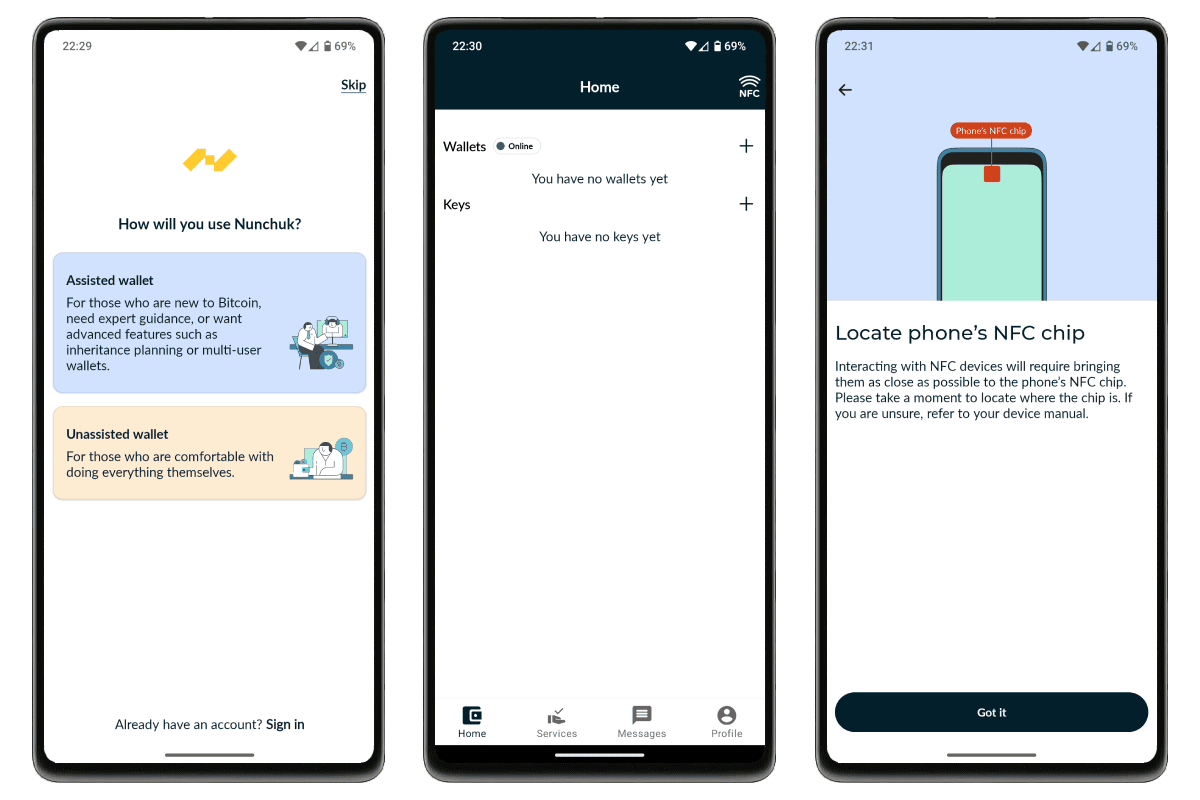
A hot wallet (also called a software wallet) is a software program that runs on any computer, phone or exchange and that stores your private keys in the software program itself, meaning it and your keys are always connected to the internet.
They can be custodial or non-custodial and most Bitcoin wallet software out there is a hot wallet. As the private keys can be accessed via the internet, they are highly vulnerable to malware and hackers. It is not recommended to keep large amounts of funds in hot wallets.
Pros & Cons Of Hot Wallets
Pros:
- Free, quick and easy to setup and use
- No need for a physical device to spend funds
- Great for experimentation, beginners, testing and those performing regular transactions
Cons:
- Your public and private keys are connected to the internet putting your digital assets at risk
- Absolutely not safe from hacking, phishing, malware, viruses or other cyber security threats
Wallets Don’t Store Your Bitcoin!
Another important thing you need to know about all Bitcoin Wallets is that they do not store any bitcoins! The name “wallet” is used because the creators of the software are trying to make it easily relatable to everyday people, but in actual fact Bitcoin Wallet software isn’t like a normal “wallet” that might store physical cash or coins. It’s not even like a bank account.
Instead, Bitcoin Wallets only ever store private keys which is what gives you access to your bitcoins. Every bitcoin is and always has been located on the Bitcoin network. In summary:
- Bitcoin Wallet: Stores your private keys
- Bitcoin Network: Stores your bitcoins
This might seem like a simple distinction, but it’s a critical one that is very important to understand and embed right from the start as otherwise it leads to lots of confusion.
People mistakenly believe that if they uninstall their Bitcoin Wallet software or if their hardware breaks then “all their bitcoins are now gone”. This isn’t true as long as you still have your private keys. Again, there are no bitcoins ever “stored” in your “wallet”, only private keys.
New to Athena Alpha? Start today!
Other Bitcoin Wallet Types
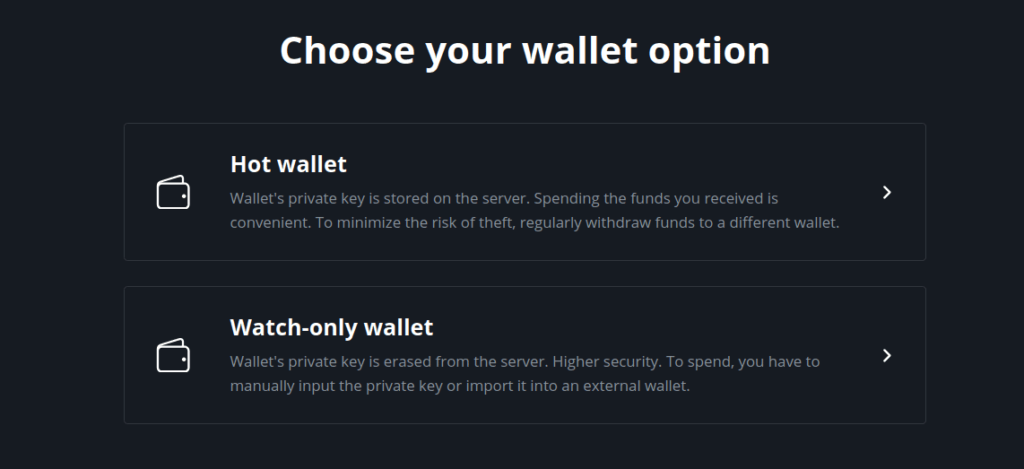
There are a number of different wallet types out there:
- Cold Wallet: A cold wallet is a software program that runs on any computer, phone or exchange and that stores your private keys in a separate, offline hardware wallet device, meaning it and your keys are never connected to the internet.
- Deep Cold Storage Wallet: A wallet is considered deep cold storage when the cold wallet device (and thus crypto keys) are kept in a highly secure, locked away place that takes a lot of time and effort to access such as in an offsite safe or in a different city entirely. This is typically used for funds in long term storage.
- Mobile Wallet: A wallet that runs exclusively on your phone. They can be custodial or non-custodial and even integrate with a hardware wallet device via USB, NFC or Bluetooth for added security. Some examples include Electrum, Nunchuk, Keeper and BlueWallet
- Browser Extension Wallet: A wallet that runs exclusively in a web browser extension program. They can be custodial or non-custodial but are usually non-custodial and don’t use hardware wallet protection. As the private keys are kept in the software, they are highly vulnerable to malware or hackers. It is recommended not to keep a large amount of funds in browser extension wallets.
- Exchange / Web Wallet: A wallet that runs in a website, similar to how a bank runs your bank account. These are usually custodian and don’t use hardware wallet protection. They also introduce third parties (the ones that own the website / exchange) and thus bring even more risks. It is recommended not to keep any amount of funds in exchange or web wallets. Some examples include Coinbase, Binance, Blockchain and BitGo
- Desktop Wallet: A wallet that runs exclusively on your desktop computer. They can be custodial or non-custodial and even integrate with a hardware wallet device via USB, NFC, QR codes or Bluetooth for added security. Some examples include Sparrow, Electrum, Nunchuk, Keeper and Specter.
- Multisig Wallet: A wallet that can only spend the funds when multiple private keys are used together, instead of a single key, avoiding a single point of failure. These private keys can be spread across multiple software and/or hardware wallets, each with their own single private key. They are usually non-custodial, but there are some services which can take custody of one of the multiple private keys for additional security called multicustodial wallets. They are the most advanced wallet type and introduce a few extra complexities in order to increase the security. For example a 2-of-3 multisig wallet might have your private keys spread across three separate hardware wallet devices. Any two are required to move the money, but the loss of any one does not result in loss of money.
Best Hot Wallets
Mobile
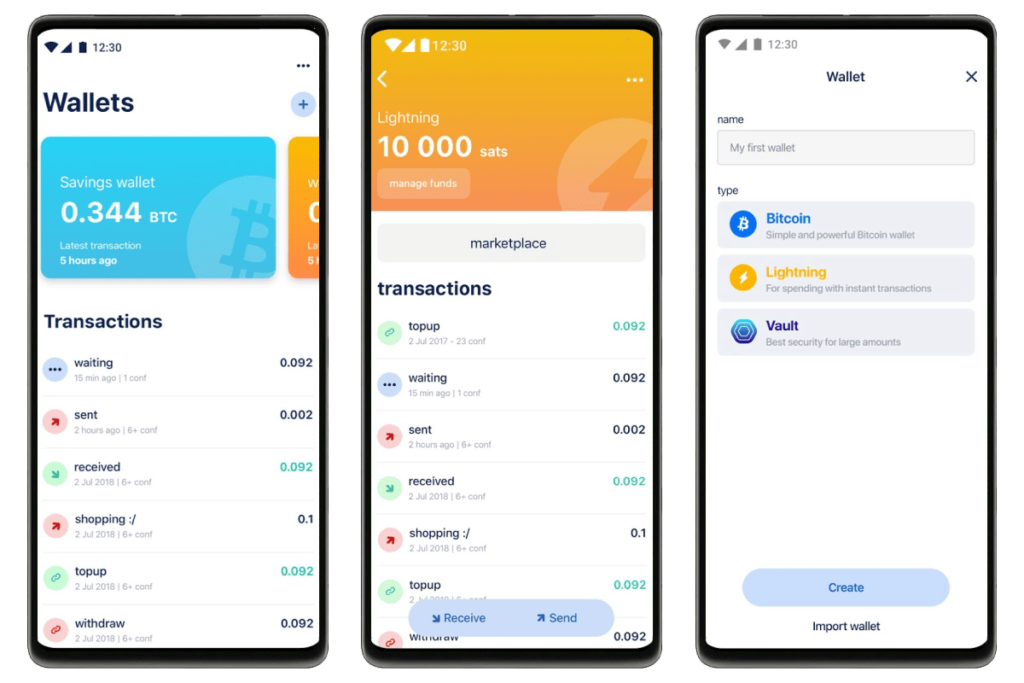
Mobile wallets should only be used to store small amounts of funds. While they (generally) operate on newer, more modern operating systems that have better (general) security than desktops, the fact is they’re still mobile phones.
This means you carry them everywhere and they can be easily and quickly stolen out of your hand at any time or place, can be left behind, dropped in the toilet, on the ground or have any other number of bad things happen to them.
Storing a key to a material portion of your wealth on an online device that you regularly carry on your person is an unacceptable compromise and should be avoided at all costs!
Instead, only use mobile wallets for small amounts of funds that are separate to your main, larger and more securely stored stash. With that out of the way, our best recommended mobile wallets in no specific order include:
Desktop
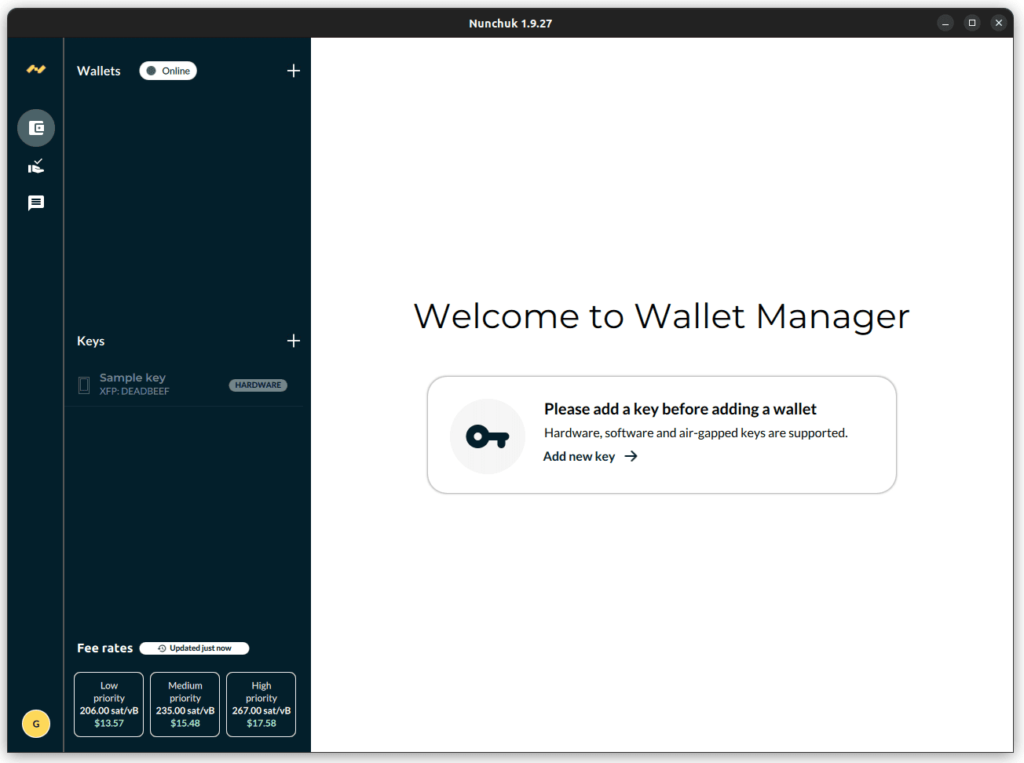
Desktop wallets allow for increased security measures and generally enable more advanced security setups like multisig. Our top recommendation for a desktop wallet is Sparrow Wallet. It is an amazing piece of FOSS and is usable for both beginners and experts. We have a number of guides for it, but some other top picks also include:
Hot Wallets vs. Cold Wallets
| Hot | Cold | |
|---|---|---|
| Cost | Free | $50-$250 |
| Best For | Pocket Money / Quick Access | Savings Account / Long Term Storage |
| Ease Of Use | Easy | Easy |
| Security | Low: Susceptible to hackers, seizures, duress or in person attacks | Medium: Susceptible to duress or in person attacks |
| Privacy | Own Node: High 3rd Party Node: Low | Own Node: High 3rd Party Node: Low |
One of the biggest risks to keeping your bitcoins safe has always been hacking, scams or social engineering which software of all types is highly susceptible to. To help users combat this cold storage wallets were created.
Going by many names such as Hardware Wallets, Signing Devices, Cold Storage Devices, Cryptocurrency Cold Storage or Cold Crypto Wallet they all use dedicated pieces of physical hardware that generate, store and manage your private keys as well as sign transactions for you.
By separating your private key onto a physical hardware device, away from your disgustingly malware infested computer that’s running the software component, it drastically increases the security of your bitcoin storage setup.
When your private keys are stored on a cold wallet, a hacker can get full control of your computer or phone and all they can do is view your wallet funds. In order to steal (or spend) your bitcoins they would need your Hardware Crypto Wallet to be plugged in and unlocked.
Then they’d also need to push physical buttons on it too somehow. This extra physical layer that cold wallets require makes hacking attacks much harder to execute, but also decreases how user friendly the wallet is.
Pros & Cons Of Cold Wallets
Pros:
- Your public or private keys are not connected to the internet keeping your digital assets safe
- Can be completely air gapped and never connected to any computer at all if you want
- Great for storing “Savings Level” of funds
Cons:
- Costs money and requires the purchase of a hardware wallet to use
- Requires the physical use of the device every time you need to do crypto transactions
- Can be more complex for beginners and requires more research to learn about and use
Best Cold Wallets
What To Consider When Picking A Bitcoin Wallet
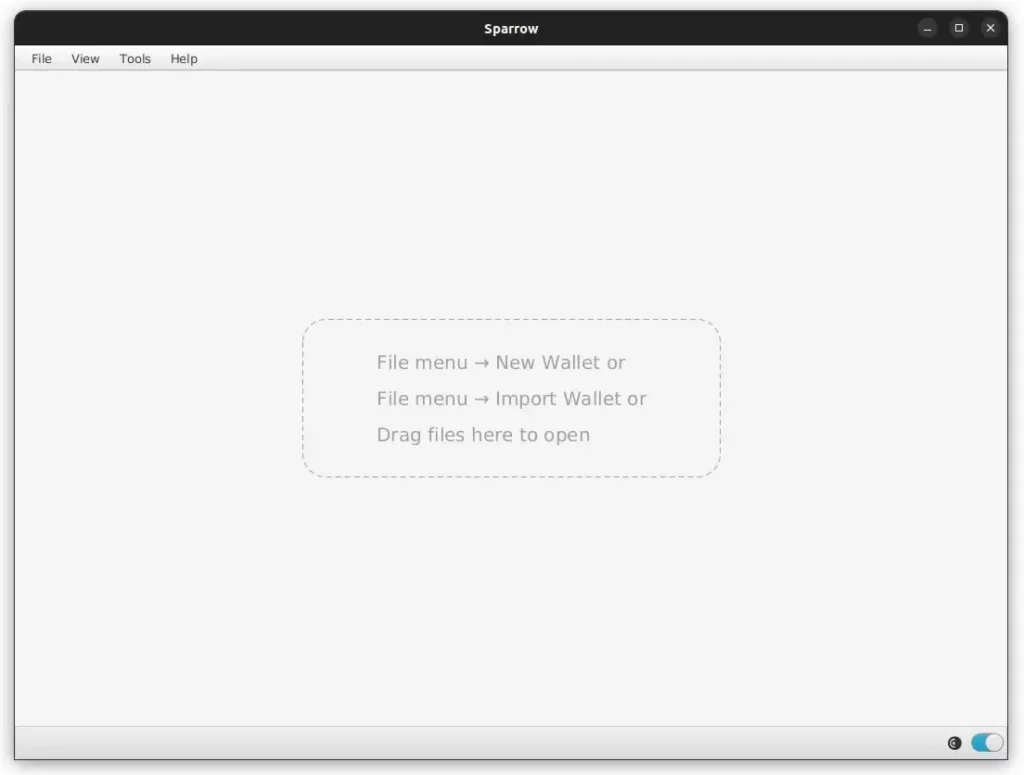
As you can imagine, with the number of wallet options, features and preferences things gets pretty complicated fast. Should you use a single signature or multisignature setup? Cold wallets or a paper wallet? Which hardware crypto wallet device should you buy? Do you even need one at all?
To begin with, we strongly recommend downloading and installing Sparrow Wallet. It’s completely free and our guide has a full run down of how to install it, set it up, how to create your first wallet, spend and more.
>> Learn More: Sparrow Wallet Ultimate Quick Start Guide
The good news is that there’s a lot of really good standardization and support for things across most wallets. For example Sparrow Wallet allows you to create software wallets or you can create a hardware crypto wallet using any number of supported 3rd party cold wallets such as BitBox, COLDCARD or SeedSigner.
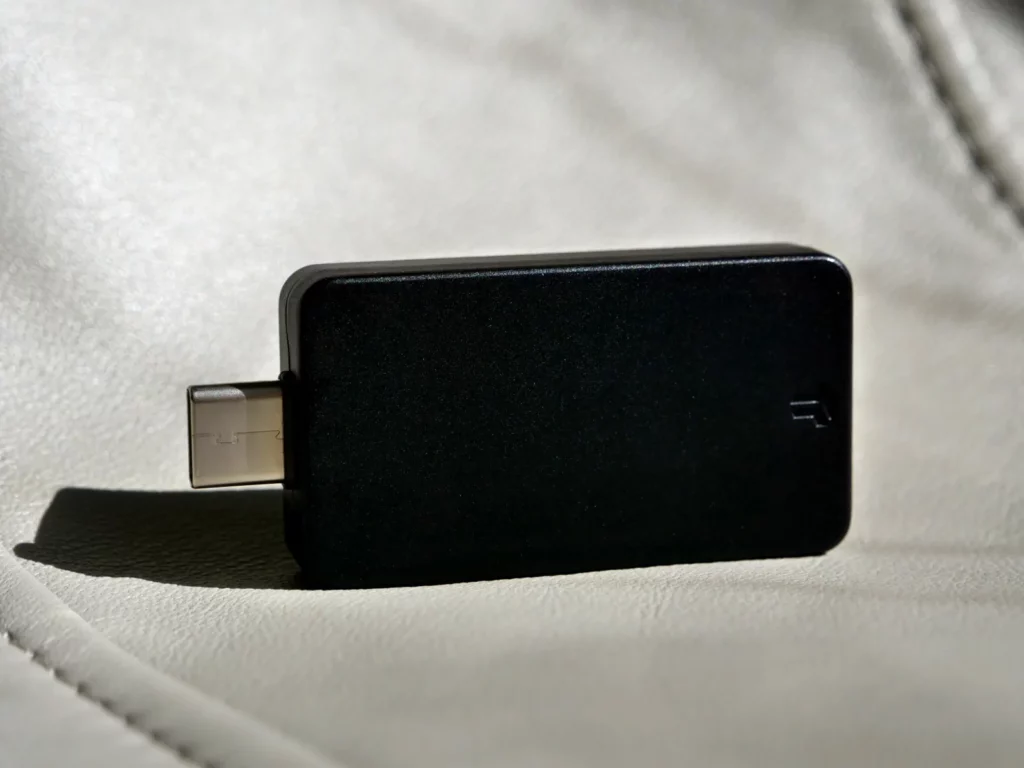
When choosing your Bitcoin wallet try to make sure it’s:
- Non-Custodian: Make sure you always have full control of your private keys
- Reputable: Make sure you fully research and vet the wallets reputation and history. There have been many cases of malware disguised as wallets that steal your bitcoins (especially on mobile App stores), so do your research carefully before deciding which one to use and trust. This also goes for any hardware crypto wallet devices you use
- Standardized: Make sure it supports the BIP-0039 standard and is generally not proprietary. Ideally you want it to be open source software that has been vetted by trusted security audits and the bitcoin community over many years
- Verifiable: Make sure it allows you to verify the signature of the manifest files with PGP keys as well as a shasum to confirm the authenticity of the binaries. This ensures that the software files you’re downloading are actually from the developers and haven’t been secretly replaced by hackers. An example of this info can be seen here and we go through the full process in our install guides
- Backup: Make sure it has robust backup and restore capabilities built into it
There are many more features that wallets have such as control over transaction fees, being able to create a secret recovery phrase, Coin Control, password protection, PIN protection, two factor authentication, Tor, Full Node connectivity and more. We will be covering all of this in future pieces so stay tuned!
FAQ
Can I Use Both Hot And Cold Wallets Simultaneously?
Yes. Both hot and cold wallets can view, create and sign transactions if they’ve got access to the right keys. A common use case is to only keep a copy of the private key on the cold wallet, while having a copy of the public key on the hot wallet. This is called a “watch only wallet” and helps keep your funds safe, whilst still allowing you to keep an eye on the wallet.
What Are The Risks Of A Hot Wallet?
The biggest risk of a hot wallet is that your public and private keys are connected to the internet putting your digital assets at risk. They are absolutely not safe from hacking, phishing, malware, viruses or other cyber security threats so long as your private key is accessible by the hot wallet program.
Is Coinbase A Hot Wallet?
Yes. Coinbase wallet is an exchange wallet, meaning that the exchange (Coinbase in this case) holds your private keys on your behalf. This means they can see all your transactions, balance plus also stop you from transacting or withdrawing your funds at any time. In extreme cases they can even steal or lose your funds, like what happened with Mt Gox or recently with FTX.
Which Is Better Hot Wallet Or Cold Wallet?
Each wallet type has its own valid use cases. Cold wallets are much more secure and should be where you store the majority of your funds, however signing a transaction can take longer due to this higher security. Hot wallets are not secure, but do allow for much faster transaction processing. Which one is “better” depends on your use case.
How Much Does A Hot Wallet Cost?
Virtually all hot wallets are completely free as they’re software based. Some collaborative custody wallets can charge ongoing fees, but these aren’t necessary. We heavily recommend Sparrow wallet for desktop or mobile wallets such as Nunchuk, Keeper and BlueWallet.



